Sébastien Racanière
Applications of flow models to the generation of correlated lattice QCD ensembles
Jan 19, 2024Abstract:Machine-learned normalizing flows can be used in the context of lattice quantum field theory to generate statistically correlated ensembles of lattice gauge fields at different action parameters. This work demonstrates how these correlations can be exploited for variance reduction in the computation of observables. Three different proof-of-concept applications are demonstrated using a novel residual flow architecture: continuum limits of gauge theories, the mass dependence of QCD observables, and hadronic matrix elements based on the Feynman-Hellmann approach. In all three cases, it is shown that statistical uncertainties are significantly reduced when machine-learned flows are incorporated as compared with the same calculations performed with uncorrelated ensembles or direct reweighting.
Advances in machine-learning-based sampling motivated by lattice quantum chromodynamics
Sep 03, 2023Abstract:Sampling from known probability distributions is a ubiquitous task in computational science, underlying calculations in domains from linguistics to biology and physics. Generative machine-learning (ML) models have emerged as a promising tool in this space, building on the success of this approach in applications such as image, text, and audio generation. Often, however, generative tasks in scientific domains have unique structures and features -- such as complex symmetries and the requirement of exactness guarantees -- that present both challenges and opportunities for ML. This Perspective outlines the advances in ML-based sampling motivated by lattice quantum field theory, in particular for the theory of quantum chromodynamics. Enabling calculations of the structure and interactions of matter from our most fundamental understanding of particle physics, lattice quantum chromodynamics is one of the main consumers of open-science supercomputing worldwide. The design of ML algorithms for this application faces profound challenges, including the necessity of scaling custom ML architectures to the largest supercomputers, but also promises immense benefits, and is spurring a wave of development in ML-based sampling more broadly. In lattice field theory, if this approach can realize its early promise it will be a transformative step towards first-principles physics calculations in particle, nuclear and condensed matter physics that are intractable with traditional approaches.
* 11 pages, 5 figures
Normalizing flows for lattice gauge theory in arbitrary space-time dimension
May 03, 2023



Abstract:Applications of normalizing flows to the sampling of field configurations in lattice gauge theory have so far been explored almost exclusively in two space-time dimensions. We report new algorithmic developments of gauge-equivariant flow architectures facilitating the generalization to higher-dimensional lattice geometries. Specifically, we discuss masked autoregressive transformations with tractable and unbiased Jacobian determinants, a key ingredient for scalable and asymptotically exact flow-based sampling algorithms. For concreteness, results from a proof-of-principle application to SU(3) lattice gauge theory in four space-time dimensions are reported.
Aspects of scaling and scalability for flow-based sampling of lattice QCD
Nov 14, 2022Abstract:Recent applications of machine-learned normalizing flows to sampling in lattice field theory suggest that such methods may be able to mitigate critical slowing down and topological freezing. However, these demonstrations have been at the scale of toy models, and it remains to be determined whether they can be applied to state-of-the-art lattice quantum chromodynamics calculations. Assessing the viability of sampling algorithms for lattice field theory at scale has traditionally been accomplished using simple cost scaling laws, but as we discuss in this work, their utility is limited for flow-based approaches. We conclude that flow-based approaches to sampling are better thought of as a broad family of algorithms with different scaling properties, and that scalability must be assessed experimentally.
Gauge-equivariant flow models for sampling in lattice field theories with pseudofermions
Jul 18, 2022
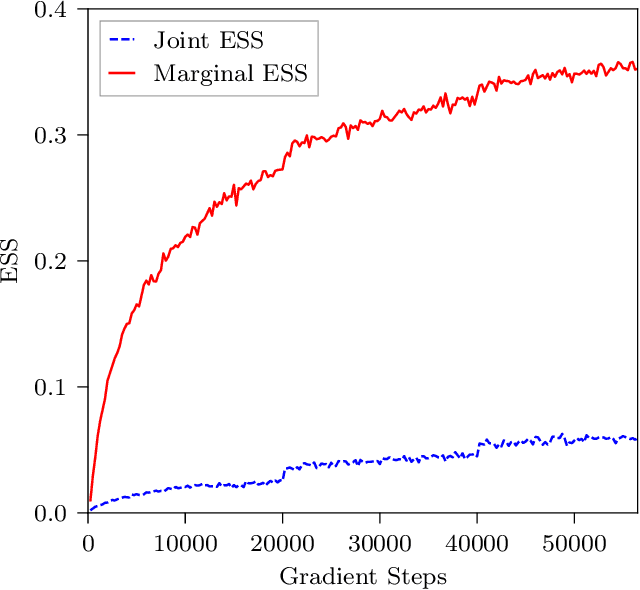
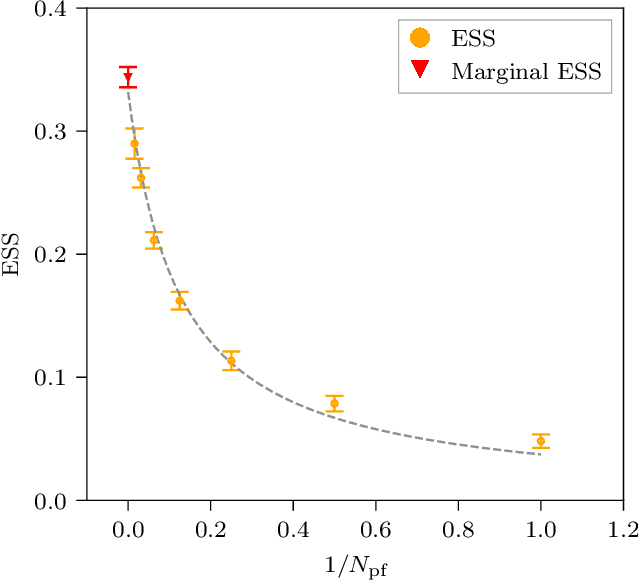
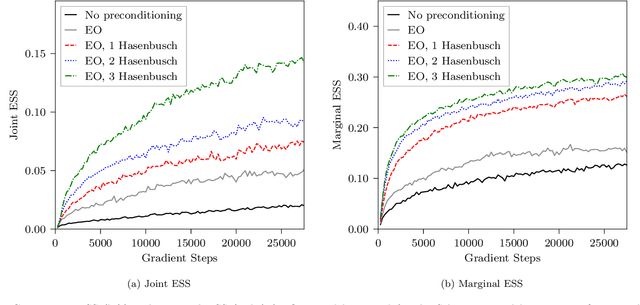
Abstract:This work presents gauge-equivariant architectures for flow-based sampling in fermionic lattice field theories using pseudofermions as stochastic estimators for the fermionic determinant. This is the default approach in state-of-the-art lattice field theory calculations, making this development critical to the practical application of flow models to theories such as QCD. Methods by which flow-based sampling approaches can be improved via standard techniques such as even/odd preconditioning and the Hasenbusch factorization are also outlined. Numerical demonstrations in two-dimensional U(1) and SU(3) gauge theories with $N_f=2$ flavors of fermions are provided.
Symmetry-Based Representations for Artificial and Biological General Intelligence
Mar 17, 2022
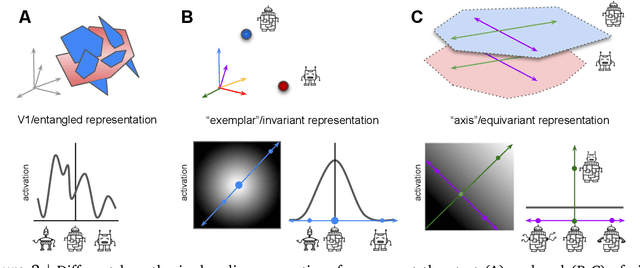
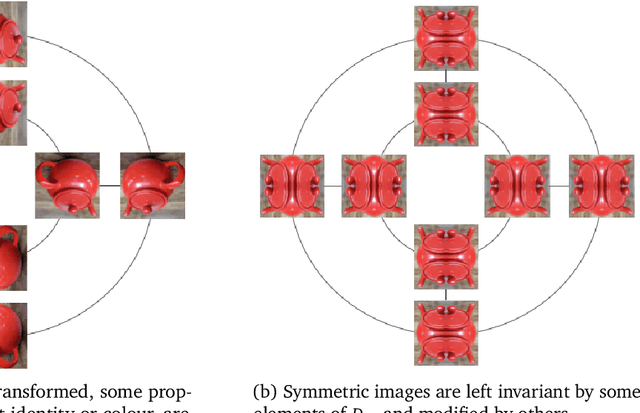
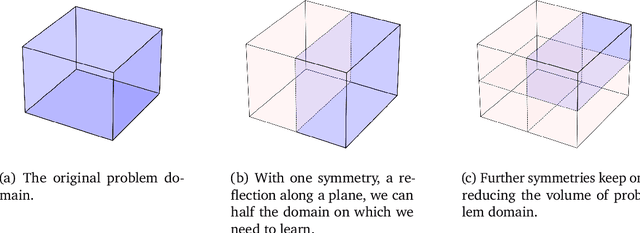
Abstract:Biological intelligence is remarkable in its ability to produce complex behaviour in many diverse situations through data efficient, generalisable and transferable skill acquisition. It is believed that learning "good" sensory representations is important for enabling this, however there is little agreement as to what a good representation should look like. In this review article we are going to argue that symmetry transformations are a fundamental principle that can guide our search for what makes a good representation. The idea that there exist transformations (symmetries) that affect some aspects of the system but not others, and their relationship to conserved quantities has become central in modern physics, resulting in a more unified theoretical framework and even ability to predict the existence of new particles. Recently, symmetries have started to gain prominence in machine learning too, resulting in more data efficient and generalisable algorithms that can mimic some of the complex behaviours produced by biological intelligence. Finally, first demonstrations of the importance of symmetry transformations for representation learning in the brain are starting to arise in neuroscience. Taken together, the overwhelming positive effect that symmetries bring to these disciplines suggest that they may be an important general framework that determines the structure of the universe, constrains the nature of natural tasks and consequently shapes both biological and artificial intelligence.
Flow-based sampling in the lattice Schwinger model at criticality
Feb 23, 2022

Abstract:Recent results suggest that flow-based algorithms may provide efficient sampling of field distributions for lattice field theory applications, such as studies of quantum chromodynamics and the Schwinger model. In this work, we provide a numerical demonstration of robust flow-based sampling in the Schwinger model at the critical value of the fermion mass. In contrast, at the same parameters, conventional methods fail to sample all parts of configuration space, leading to severely underestimated uncertainties.
Normalizing flows for atomic solids
Nov 16, 2021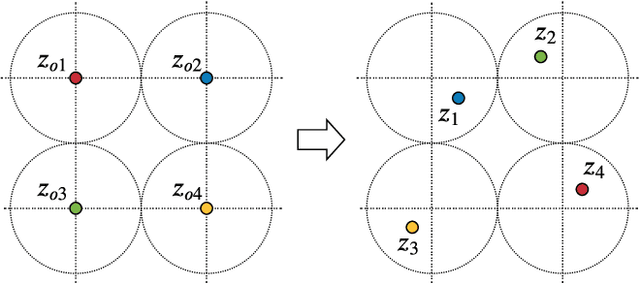

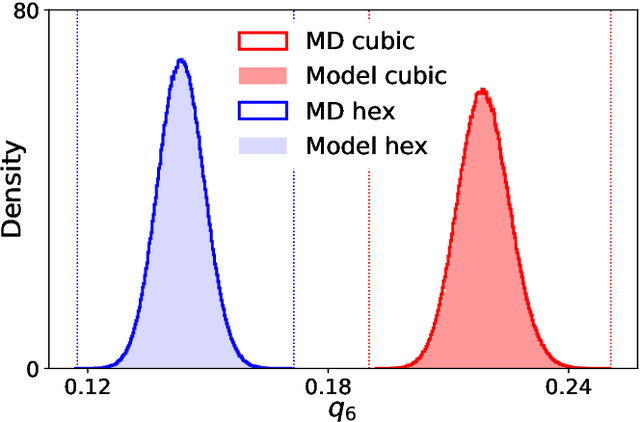
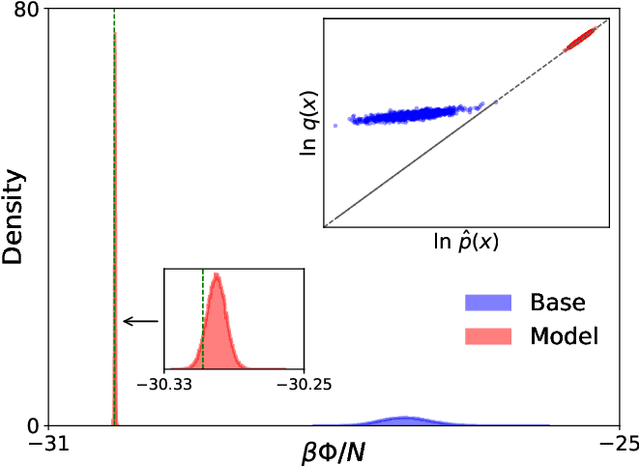
Abstract:We present a machine-learning approach, based on normalizing flows, for modelling atomic solids. Our model transforms an analytically tractable base distribution into the target solid without requiring ground-truth samples for training. We report Helmholtz free energy estimates for cubic and hexagonal ice modelled as monatomic water as well as for a truncated and shifted Lennard-Jones system, and find them to be in excellent agreement with literature values and with estimates from established baseline methods. We further investigate structural properties and show that the model samples are nearly indistinguishable from the ones obtained with molecular dynamics. Our results thus demonstrate that normalizing flows can provide high-quality samples and free energy estimates of solids, without the need for multi-staging or for imposing restrictions on the crystal geometry.
Implicit Riemannian Concave Potential Maps
Oct 04, 2021



Abstract:We are interested in the challenging problem of modelling densities on Riemannian manifolds with a known symmetry group using normalising flows. This has many potential applications in physical sciences such as molecular dynamics and quantum simulations. In this work we combine ideas from implicit neural layers and optimal transport theory to propose a generalisation of existing work on exponential map flows, Implicit Riemannian Concave Potential Maps, IRCPMs. IRCPMs have some nice properties such as simplicity of incorporating symmetries and are less expensive than ODE-flows. We provide an initial theoretical analysis of its properties and layout sufficient conditions for stable optimisation. Finally, we illustrate the properties of IRCPMs with density estimation experiments on tori and spheres.
Flow-based sampling for fermionic lattice field theories
Jun 10, 2021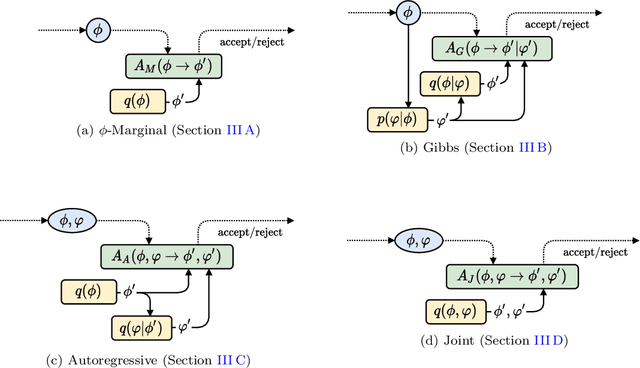


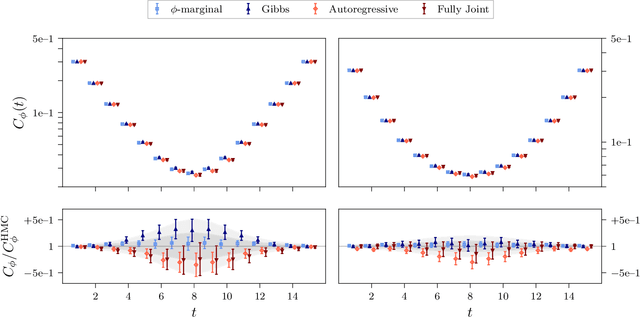
Abstract:Algorithms based on normalizing flows are emerging as promising machine learning approaches to sampling complicated probability distributions in a way that can be made asymptotically exact. In the context of lattice field theory, proof-of-principle studies have demonstrated the effectiveness of this approach for scalar theories, gauge theories, and statistical systems. This work develops approaches that enable flow-based sampling of theories with dynamical fermions, which is necessary for the technique to be applied to lattice field theory studies of the Standard Model of particle physics and many condensed matter systems. As a practical demonstration, these methods are applied to the sampling of field configurations for a two-dimensional theory of massless staggered fermions coupled to a scalar field via a Yukawa interaction.
 Add to Chrome
Add to Chrome Add to Firefox
Add to Firefox Add to Edge
Add to Edge